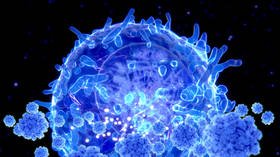Covid-19 immunity could be far higher than antibody tests show, according to new SARS research

Researchers in Singapore have found a group of survivors of the SARS epidemic in 2003 who have held onto their T cells in the intervening 17 years, providing a glimmer of hope for a long-lasting immunity to Covid-19.
T cells are a type of white blood cell, and are the frontline troops our bodies deploy to fight off disease and infection. In a study led by Duke-NUS Medical School in Singapore, blood samples were taken from 23 SARS patients to check for any remaining effective immune cells.
They found that some of those infected back in 2003 still have their Killer T cells and therefore might be protected from SARS re-infection. There have been no recorded cases of SARS, another kind of coronavirus, since 2004.
These findings support “the notion that Covid-19 patients will develop long-term T cell immunity,” the researchers wrote.
Also on rt.com Scientists develop new tool in fight against CANCERS and VIRUSES that sequences circular DNAOther studies cited in the research showed that people who have had a common cold in the past two years have shown ‘cross-reactive protection’ against Covid-19 thanks to some leftover T cells.
Scientists at the La Jolla Institute for Immunology in California previously said it was “tempting to speculate” about such an underlying pre-existing protection against Covid-19.
This marks a significant development for vaccine research, as it would help determine how often we might need a booster shot once a vaccine is found.
The researchers took it one step further and tested the SARS-era ‘veterans’ against SARS-CoV-2 and, sure enough, they displayed a “robust” reactivity in fighting off infection.
Also on rt.com Achilles’ heel of ALL viruses? Scientists discover holy grail which could lead to UNIVERSAL vaccineThe team then recruited 37 volunteers who had never had either coronavirus to see if previous exposure had yielded any underlying protection, and what they found was remarkable: despite no exposure to either SARS or SARS-CoV-2, 50 percent (19) of the participants had T cells able to at least grapple with Covid-19 virus cells.
“Surprisingly, we also frequently detected SARS-CoV-2 specific T cells in individuals with no history of SARS, Covid-19, or contact with SARS/Covid-19 patients,” the authors wrote.
The research suggests immunity to Covid-19 is higher than antibody testing reveals, and once again throws open the possibility of underlying immunity and the potential for an effective vaccine sooner than initially thought.
Think your friends would be interested? Share this story!













